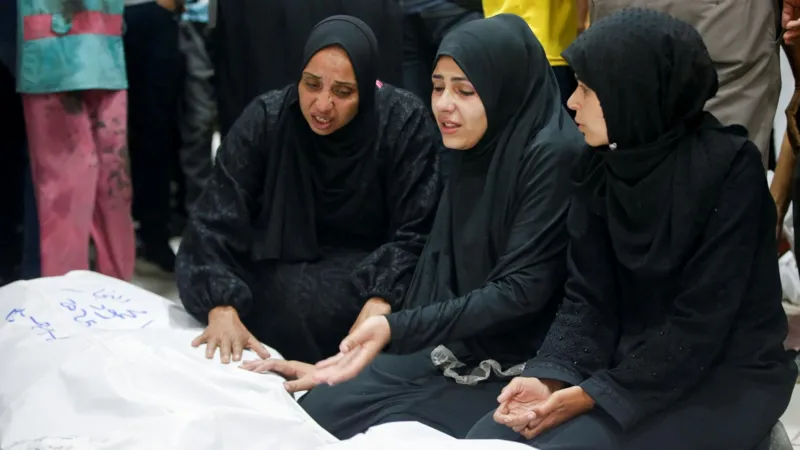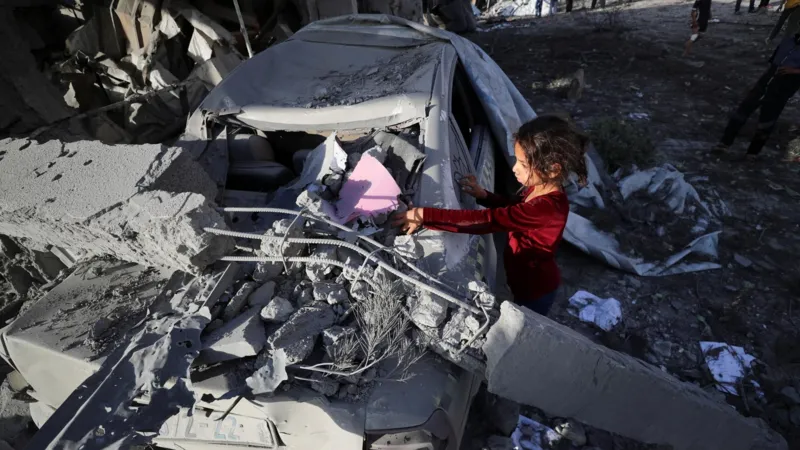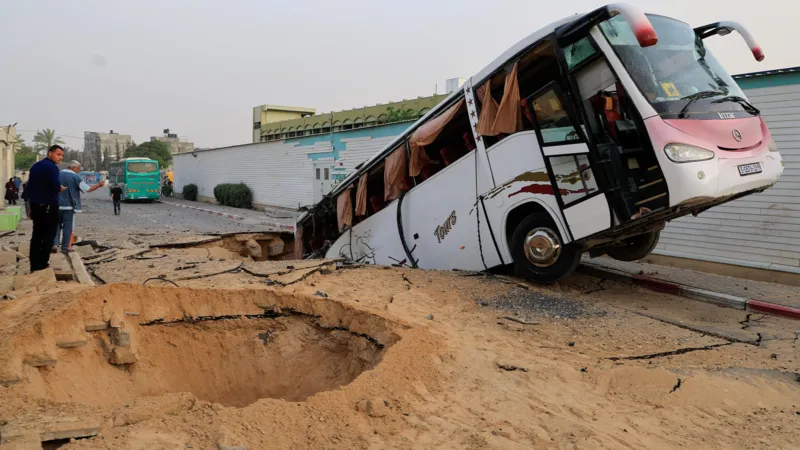As Israeli strikes across Gaza intensify, the death toll continues to rise. Recent airstrikes on May 14, 2025, have left at least 80 people dead, including women and children, as the region grapples with an ongoing humanitarian disaster. Amid escalating violence, calls for international intervention to stop the genocide in Gaza have intensified, with global concerns mounting over the blockade’s devastating impact on Gaza’s civilian population.

Escalating Violence:
The overnight strikes on Jabalia in northern Gaza have caused widespread destruction, with multiple homes destroyed and dozens of civilians killed. The Indonesian hospital reported 22 children and 15 women among the dead, while al-Awda hospital confirmed the reception of additional bodies, primarily children. These attacks are part of a broader Israeli military campaign targeting Hamas and Palestinian Islamic Jihad fighters, but civilian casualties continue to mount.
The Israeli military’s actions have sparked outrage, particularly following claims that food and humanitarian assistance are being intentionally withheld, exacerbating the already dire living conditions in Gaza. The UN and humanitarian agencies continue to criticize Israel for its blockade, which has trapped more than two million civilians without access to essential aid.

International Reactions:
International leaders, including the UN’s humanitarian chief, have raised alarm over the deteriorating situation in Gaza. Tom Fletcher, the UN’s top humanitarian official, accused Israel of using humanitarian aid as a weapon of war, deliberately starving civilians to gain military leverage. The UN has called for urgent action to prevent further genocide in Gaza, echoing growing concerns about the systemic destruction of the region’s population.
Israel’s envoy to the UN, however, has strongly denied these accusations, insisting that the blockade is necessary to prevent Hamas from using aid to support its war efforts. Despite this, global outrage over the humanitarian crisis continues to grow, with countries across the world demanding an end to the violence and more comprehensive aid efforts.

The Human Cost:
Gaza’s civilian population has been enduring extreme hardship. With hospitals running out of medical supplies and fuel for their generators, many lives are being lost not due to direct conflict but because of a lack of food, water, and medical care. The UN’s Integrated Food Security Phase Classification (IPC) reports that 470,000 Gazans are in a catastrophic state of acute malnutrition, with children and mothers in urgent need of medical treatment.
As the violence continues, the situation in Gaza becomes more dire by the day. Thousands of families are being forced to flee their homes with little more than the clothes on their backs, only to be displaced again by Israeli bombings and airstrikes. As a result, international organizations are calling for an immediate ceasefire and humanitarian aid to be allowed into Gaza to provide relief to the millions of people suffering from food insecurity, illness, and injury.

Israel’s Justification and Response:
Israeli Prime Minister Benjamin Netanyahu has reaffirmed Israel’s commitment to its military campaign, stating that the strikes are necessary to eliminate Hamas and ensure the safety of Israel’s citizens. However, with the growing death toll in Gaza, many critics argue that Israel’s actions go far beyond self-defense, with the continued destruction of civilian infrastructure and the targeting of hospitals and schools raising questions about Israel’s adherence to international humanitarian law.
Despite the ongoing violence, Israel’s government remains resolute, refusing to halt its military operations. Netanyahu’s recent remarks about “no situation” where Israel will stop the war indicate that Israel’s leadership is committed to continuing the offensive until Hamas is defeated, despite the growing international condemnation.
Calls for Ceasefire:
As the death toll rises, the international community is becoming increasingly vocal about the need for a ceasefire. US President Donald Trump, who is currently in the Middle East meeting with Gulf leaders, has expressed hope that more hostages will be released from Gaza, signaling a possible path to peace. In response to these calls, Hamas has released one of the remaining hostages as a goodwill gesture, further fueling hopes of a possible diplomatic breakthrough.

However, Netanyahu’s refusal to endorse a ceasefire and his pledge to expand the military offensive suggests that the situation is far from over. The future of Gaza remains uncertain, with many fearing that the ongoing violence will continue to claim innocent lives.
Conclusion:
The ongoing violence in Gaza has reached catastrophic levels, with over 80 people killed in a single day, many of whom are women and children. As Israel continues its offensive and the humanitarian crisis deepens, calls for international intervention and an immediate ceasefire are growing louder. The world watches as Gaza’s population suffers from starvation, displacement, and violence, and the need for a lasting peace agreement becomes ever more urgent.
Author Profile
- Syed Tahir Abbas is a Master's student at Southwest University, Chongqing, specializing in international relations and sustainable development. His research focuses on U.S.-China diplomacy, global geopolitics, and the role of education in shaping international policies. Syed has contributed to academic discussions on political dynamics, economic growth, and sustainable energy, aiming to offer fresh insights into global affairs.
Latest entries
 GeopoliticsAugust 23, 2025Previewing the White House Visit of South Korean President Lee Jae Myung
GeopoliticsAugust 23, 2025Previewing the White House Visit of South Korean President Lee Jae Myung Middle East ConflictJuly 22, 2025Israel’s Deadly Attacks on Gaza: A Dire Humanitarian Crisis and International Calls for a Truce
Middle East ConflictJuly 22, 2025Israel’s Deadly Attacks on Gaza: A Dire Humanitarian Crisis and International Calls for a Truce Middle East & North AfricaJuly 20, 2025Israel Targets Damascus Amid Rising Tensions in Syria
Middle East & North AfricaJuly 20, 2025Israel Targets Damascus Amid Rising Tensions in Syria Middle East AffairsJuly 14, 2025An Open Letter from Gaza’s University Presidents: Resisting Scholasticide Through Education
Middle East AffairsJuly 14, 2025An Open Letter from Gaza’s University Presidents: Resisting Scholasticide Through Education


1 comment
Your writing always has such a fresh and engaging style! Every post feels like a conversation with a friend. Keep inspiring us! 👏